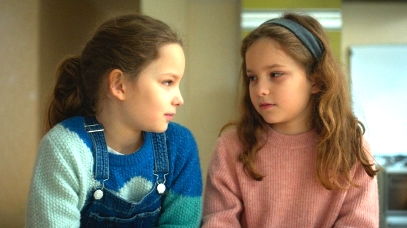

Céline Sciamma’s fairy tale-like film, presented as matter of fact, presents the fulfillment of a little girl’s desire to know what her mother was like when she was a girl.
French writer-director Céline Sciamma has followed up her big success from 2019, Portrait of a Lady on Fire, with a surprising stor
y of childhood, called Petite Maman. Sometimes simplicity is a radical choice, and Sciamma, who is fond of exploring new frontiers in feminist cinema, presents a vision of young girls and mothers with a sense of beauty and rightness that seems almost too easy, until you stop to consider the delicate artistry that it took to make the film.
We first see eight-year-old Nellie helping an old lady with a crossword puzzle. When the girl leaves the room, we see that she’s in a nursing home. As she passes a couple of rooms she says goodbye to the women living in them. In the fourth room is her mother, packing everything up. Only later does it occur to us that the lady in the first scene was Nelly’s grandmother, whom she was named after. Sciamma has telescoped the time scheme and now the grandmother has recently died. The mother, Marion, is stricken and quiet with grief.
They go to the grandmother’s old house in the country to join Nelly’s father, who is helping Marion clean up the house and pack everything up. Marion grew up in this house. She finds old notebooks with writings from when she was a girl. Nelly wants to know what it was like then, and her mother tells her a few things, including the story of a little hut she built in the nearby woods where she would go sometimes. But the grief makes her pretty closed mouth about the past right now. Nelly asks her father if he knew about the hut, but he says Marion never told him.
Then, mysteriously, one morning, the mother has gone away, without saying goodbye, leaving Nelly alone in the house with her father. His explanation is that she just needed to be alone for awhile.
Later, wandering in the nearby woods by herself, Nelly sees a little girl dragging a rather large tree branch. Silently, she helps the girl drag the branch further into the woods, and lo and behold, there are the beginnings of a hut. The strange girl, who looks a great deal like Nelly, invites her to her house nearby. When they get to the gate leading to the little yard, Nelly sees that the house looks exactly the same as the house she just came from. The indoors has the same plan and features too. “What’s your name?” she asks the other girl. “Marion,” she says.
Is what we think is happening here actually happening? The fairy tale-like concept is so simple that I resisted it at first. In fact, Sciamma does not resort to any magic formula. The only spell, really, is Nelly’s desire to know what her mother’s girlhood was like. Sure enough, at the new house she meets the girl’s mother who is named Nelly and has a limp just like her grandmother did. But the point of all this is not to dazzle us with any Twilight Zone-type effects. Instead everything is very plain, straightforward, and matter of fact.
Much of the film’s beauty is attributable to the two child actresses, who are sisters, Joséphine and Gabrielle Sanz. They are serious and thoughtful, even when playing together. Sciamma has elicited utterly natural performances from them. The idea, the film’s point, if you will, is felt intuitively, and represents a deep connection that a girl has with her mother, in this case a loving mother, and the need to bond with the girl the mother used to be. And it’s also very much about girls’ relationships with other girls. Beautifully shot and edited, with a brilliant sound design and color scheme, Petite Maman is a blissfully moving experience.






